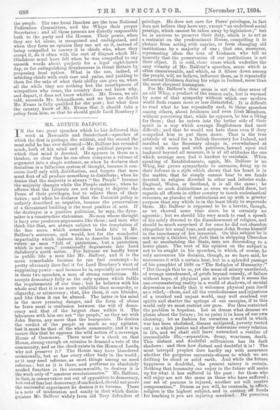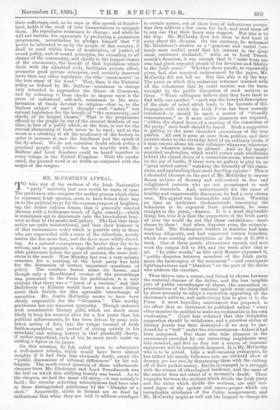MR. ARTHUR BALFOUR.
IN the two great speeches which be has delivered this week at Newcastle and Sunderland—speeches of which the first is perhaps the wittiest, and the second the most solid he has ever delivered—Mr. Balfour has revealed much, both of his mind and of the political purpose to which that mind is devoted. He appears in them as a thinker, so clear that he can often compress a volume of argument into a single sentence, as when he declares that Socialism is a fallacious system of thought, because it con- cerns itself only with distribution, and forgets that men must first of all produce something to distribute ; when he denies that the majority is always "the People" because the majority changes while the People endures ; when he affirms that the Liberals are not trying to deprive the Peers of their privileges, but to relieve them of their duties ; and when lie declares that the Unionist policy is unfairly described as negative, because the preservation of a threatened building is the most positive of acts. If the destroyer is a positive politician, he says, the dyna- miter is a constructive statesman. No man whose thought is hazy ever produces arguments like those ; and men who think like that, are always subject to the temptation of the fine scorn which sometimes lends bite to Mr. Balfour's sentences, and would, but for the wonderful impartiality which induces him to describe Irish Home- rulers as men "full of patriotism, tut a patriotism which is not ours," occasionally degenerate into Lord Salisbury's acrid satire. For fairness we hardly know in public life a man like Mr. Balfour, and it is the .more remarkable because he can feel contempt—he pretty obviously does feel it for Lord Rosebery's want of suggesting power—and because he is, especially as revealed in these two speeches, a man of strong convictions. He accepts democracy fully as the only system which fulfils the requirements of our time • but he believes with his whole soul that it is no more infallible than monarchy, or oligarchy, or aristocracy ; that, like them, it can blunder, and like them it can be abused. The latter in his mind is the more pressing danger, and the form of abuse he fears most is confusion between the will of demos .cracy and that of the largest class within it. The labourers with him are net "the people," as they are with .John Burns, any more than the bourgeoiaie. He desires 'the verdict of the people as much as any agitator, bat it must be that of the whole community, and it is to insure this that he opposes the wild notion of a sovereign House of Commons. There must be a check on that House, strong enough on occasion to demand a vote of the community, and as the check exists in the House of Lords, why not preserve it ? The House may have blundered occasionally, but so has every other body in the world ; or it may need reforms, as most things among us need reforms ; but as it is there, and performs an absolutely needed function in the commonwealth, to destroy it is the work only of" amateur revolutionaries." Mr. Balfour, in fact, is conservative not out of opposition to democracy, but out of fear lest democracy, if unchecked, should not prove the successful experiment he desires it to become. There is a note of moderation and sanity in that which distin- guishes Mr. Balfour widely from old Tory defenders of privilege. He does not care for Peers' privileges, in fact does not believe they have any, except " an undefined social prestige, which cannot be taken away by legislation ;" but he is anxious to preserve their duty, which is to act as a restraint on the predominant House, compelling it to abstain from acting with caprice, or from changing old institutions by a majority of one ; that one, moreover, representing often the vote of Irishmen who tell us honestly that the preservation of our institutions is not their object. It is cold, clear sense which underlies the easy vivacity of Mr. Balfour's speeches, sense which is often unanswerable, and which, as it filters down among the people, will, we believe, influence them, as it repeatedly influenced Irishmen during his reign in Ireland, more than the most eloquent harangues. For Mr. Balfour's clear sense is not the clear sense of an old Whig, a product of the reason only, but is warmed by some of that sympathy without which our modern world finds reason more or less distasteful. It is difficult to read what he has repeatedly said, in these speeches among others, about Irishmen and even Irish Members, without perceiving that, while he opposes, he has a liking for them ; that he enters into the better side of their spirit in a way which average Englishmen find most difficult; and that he would not hate them even if duty compelled him to put them down. That is the true attitude of mind for a British Secretary for Ireland, and insulted as the Secretary always is, overwhelmed at once with scorn and with petitions, fawned upon and traduced beyond all measure, it is of all attitudes the one which average men find it hardest to maintain. When speaking of Establishments, again, Mr. Balfour is no Whig, but grows sympathetic to unreason, firing up in their defence in a style which shows that his heart is in the matter, that he simply cannot bear to see funds devoted to religion diverted to other and inferior ends. England, Wales, or Scotland, it is all the same ; he draws no such distinctions as even we should draw, but regards all efforts in either country to touch ecclesiastical revenues, as plunder of institutions set up with a greater purpose than any which is in the least likely to supersede them. Mr. Balfour is supposed to be a heretic, though, as we showed some time since, he is certainly no agnostic ; but we should like very much to read a speech of his solely devoted to the disendowment of religion, and should be much surprised if for once he did not abandon altogether his usual tone, and surpass John Burns himself in the trenchancy of his invective. On this subject he is not merely a thinker, but feels that in stripping Churches and so secularising the State, men are descending to a lower plane. The root of his opinion on the subject is not to be sought in his speeches, in which, of course, he only announces his decision, though, as we have said, he announces it with a certain heat, but in a splendid passage of his pamphlet of 1888 on "The Religion of Humanity:" "But though this be so, yet the sense of misery unrelieved, of wrongs unredressed, of griefs beyond remedy, of failure without hope, of physical pain so acute that it seems the one overmastering reality in a world of shadows, of mental depression so deadly that it welcomes physical pain itself as a relief, —these, and all the crookednesses and injustices of a crooked and unjust world, may well overload our spirits and shatter the springs of our energies, if to this world only we must restrict our gaze. For thus restricted the problem is hopeless. Let us dream what dreams we please about the future ; let us paint it in hues of our own choosing ; let us fashion for ourselves a world in which war has been abolished, disease mitigated, poverty rooted out ; in which justice and charity determine every relation in life, and we shall still leave untouched a residue of irremediable ills,—separation, decay, weariness, death. This distant and doubtful millennium has its dark shadows : and then how distant and doubtful it is ! The most intrepid prophet dare hardly say with assurance whether the gorgeous mountain-shapes to which we are drifting be cloud or solid earth. And while the future happiness is doubtful, the present misery is certain. Nothing that humanity can enjoy in the future will mate up for what it has suffered, in the past : for those who will enjoy are not the same as those who have suffered ; one set of persons is injured, another set will receive compensation." Dream as you will, he contends, in effect, religion is the highest subject, and in cutting off funds for teaching it you are injuring mankind. He perceives their sufferings, and, as be says in this speech at Sunder- land, holds it the work of true Conservatives to mitigate them. He repudiates resistance to change ; and while he will not imitate his opponents by producing a premature programme, nevertheless be pledges himself that "if power be intrusted to us by the people of this country, it shall be used within lines of moderation, of justice, of sound policy, and of sound principles, for extending to all classes of the community, and chiefly to the largest classes of the community, the benefit of that legislation which deals with the admitted evils, facilitates private effort, promotes good private enterprise, and certainly deserves more than any other legislation the title 'constructive' in the true sense of the word." That, then, is the Unionist policy as defined by Mr. Balfour—resistance to change only intended to aggrandise the House of Commons, and by releasing it from checks to impose upon it the curse of unfettered self-will, resistance to the secu- larisation of funds devoted to religion—that is, to the highest subject of man's thought—and " sober " but earnest legislation for the benefit of "the community, and chiefly of its largest classes." That is the programme offered to the people by one of the clearest thinkers of our time, in lieu of a policy which, at the best, is one for the eternal sharpening of tools never to be used ; and at the worst is a crushing of all the machinery of the factory in order to increase at once the loneliness and the speed of the fly-wheel. We do not ourselves doubt which policy a practical people will prefer ; but we heartily wish Mr. Balfour and Lord Rosebery could be heard together in every village in the United Kingdom. With the unedu- cated, the printed word is so feeble as compared with the magic of the tongue.



















































 Previous page
Previous page